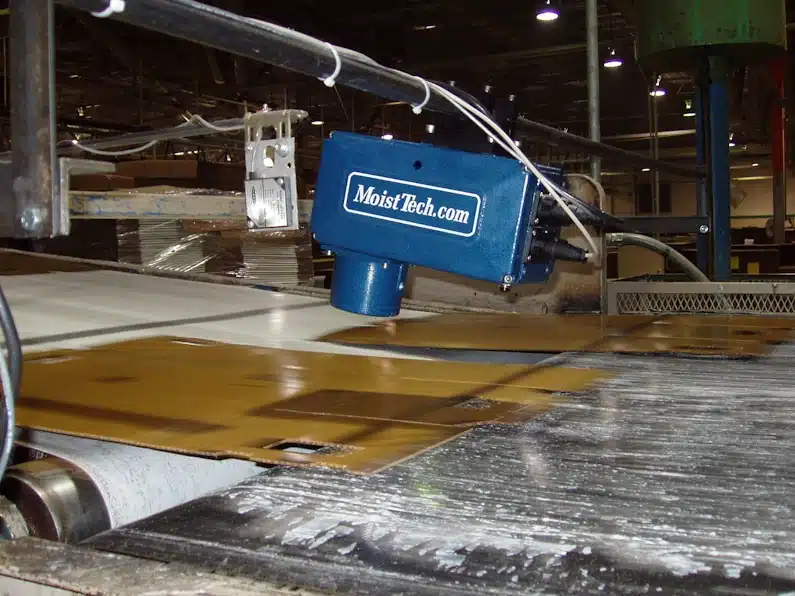The importance of accurate moisture measurement on a processing line cannot be overstated. Whether in the food and beverage industry, pharmaceuticals, textiles, or any sector dependent on stringent quality control, maintaining the right moisture levels is a non-negotiable element of production.
In this blog, we’ll shed light on the critical role played by moisture sensors and provide you with the knowledge to make an informed choice that meets your specific industrial needs.
Types of Moisture Measurement Technology
Near Infrared (NIR) Sensors
Near infrared (NIR) sensors are the leading moisture measurement technology of today, due to their instantaneous and non-destructive mode of measuring moisture. NIR moisture sensors use a light source to measure the moisture level, so that production lines can keep running, and product isn’t wasted. Not only do they measure moisture, but also coating, oil and temperature, too.
Near Infrared (NIR) Sensors Summary:
- Instant Measurement
- Non-Destructive Sensor
- Accurate to within 0.1%
Microwave Moisture Measurement
Microwave moisture sensors are often called moisture meters, and refer to a smaller, hand-held device. When microwaves pass through water in the top layer of material, they slow down and get weaker because the water absorbs the energy. By comparing how the signal changes as it goes through the material, we can figure out how much moisture is there.
Microwave Moisture Meters Summary
- Convenient, hand-held device can be convenient
- Only measures moisture in the top layer of the material
- Very little accuracy
Radio Frequency Moisture Sensors
Radio frequency (RF) measurement uses a probe to measure deeper into materials, like wood or gypsum. The probe needs to touch the material or be kept at a consistent distance and temperature, and therefore limits the industry application. Additionally, the radio frequency moisture sensor requires moisture to be between 3-50%. Anything out of that range will inhibit its ability to accurately detect moisture.
Radio Frequency Moisture Meter Summary
- Contact with material is required
- Limited application use
- Very little accuracy
Nuclear Moisture Detection
Nuclear moisture detection is an additional form of measuring moisture in a material. It works when a handheld moisture meter (as opposed to an industrial moisture sensor) sends out neutrons that hit the hydrogen atoms in the material. When the neutrons bounce back, it’s an indication of the level of moisture present.
Nuclear Moisture Detection Summary
- Damages materials
- Expensive
Manual Moisture Testing
Water content is calculated by finding the difference between the initial weight and dry weight, then dividing it by the dry or total weight. However, even this simple method can have inconsistencies and is not recommended for an industrial scale operation. Usually is very time consuming and depending on how far the lab is, moisture is loss during the transfer.
Additional Factors to Consider
In addition to the benefits and drawbacks of each type of moisture measurement sensor, it’s important to explore other factors in the decision-making process.
Cost-Benefit Analysis
When looking for a moisture sensor to monitor your product quality, it’s important to take full account of the total cost and benefits of the moisture sensor. What will the product cost? What is the potential cost of any damaged product? What is the labor and opportunity cost of extra processing time?
Shipping
Shipping times can vary from 3-8 weeks or more. Reach out to a representative to know how long it will take to arrive. The lost opportunity cost of waiting a few days could save you thousands of dollars.
Maintenance
Maintenance should be top-of-mind when selecting an on-line moisture sensor. Not all moisture sensors require annual calibration and maintenance, but regardless, be sure that the company’s customer service is available and willing to help if any trouble arises.
Explore MoistTech’s On-line Moisture Sensor: IR3000
MoistTech is the world’s leading moisture measurement technology, with more than 40 years of experience and 50,000 completed projects. Its NIR moisture sensor allows for precise measurements on a variety of applications, so that you can make real-time adjustments without slowing down your processing line.
Companies around the world choose MoistTech for a variety of reasons. Get a quote today!
- Unbeatable precision
- Increase efficiency by 400%
- Instant measurements
- Non-contact measurements

